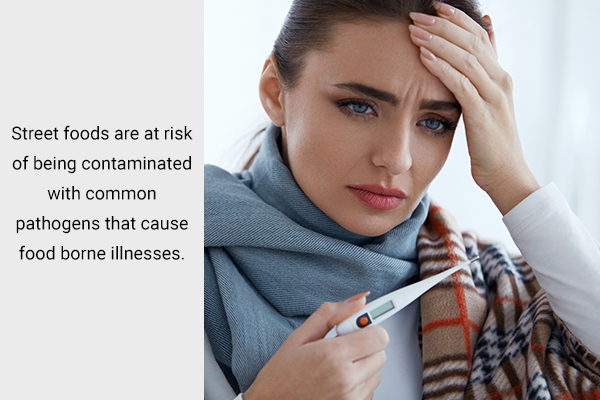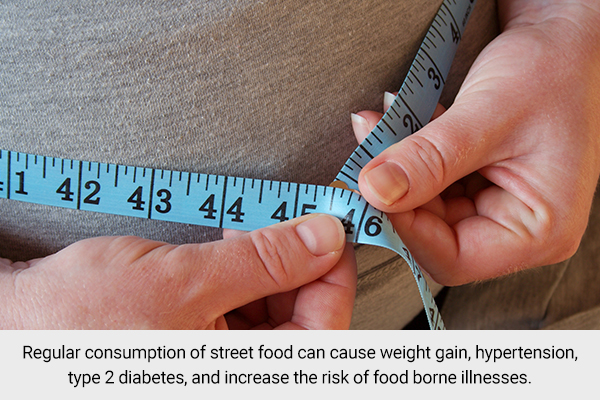In this article:
If you have visited South or Southeast Asian countries, chances are you have seen street vendors selling a variety of foods ranging from cut fruits and fresh juices to fried delicacies and sandwiches.

Street food forms an important component of a country’s cultural experience and is not always as bad as they are portrayed.
In developing countries, street foods provide easy and relatively inexpensive ready-to-eat meal options for busy office workers. They are also sources of employment for people in highly populated urban cities, creating an income stream. (1)
Though street foods are not entirely bad and should not be avoided altogether, they should be carefully chosen to avoid health risks.
Reasons Eating Street Foods Should Be Avoided
Street foods may pose these health risks you need to watch out for.
1. Contribute to obesity
Street foods are often made from refined wheat flour devoid of fiber. They are also made with cheap ingredients that are processed or high in fat in order to keep the cost low.
Studies have shown street foods such as sandwiches or fried chicken to be significantly associated with increased weight and body mass index (BMI). (2)(3)
2. Increase the risk of chronic illnesses
A recent study evaluating the nutritional composition of street foods found them to be high in trans fat and sodium and poor in potassium. (4)
A diet high in sodium and trans fat and in fiber is significantly associated with the occurrence of heart diseases such as hypertension. (3)
A study in 2021 found regular street food consumers to be at an increased risk of diseases such as type 2 diabetes, hypertension, and other heart diseases, along with weight gain. (5)
3. May cause foodborne illnesses

Street foods are at risk of being contaminated with common pathogens that cause foodborne illnesses. Poor hygiene practices and compromised sources of raw material are the major reasons for contamination. (1)
A study published in the Journal of Research Studies in Agricultural Sciences found that only 4.7% of vendors (in areas of Ethiopia) stored leftover foods in refrigerators before serving. The majority of vendors displayed foods in trays without cover.
In addition, almost 54% of vendors did not cover their hair, 52% exposed their food to flies, and an alarming 74% did not bother washing their ingredients before cooking. (6)
4. May contain heavy metals
Spices and sauces used in the preparation of street foods may also be contaminated with heavy metals such as lead, mercury, and cadmium. (7)
Though one study has found the levels (except lead) to be tolerable, it concluded street food consumption to be a cause of concern. (8)
How to Choose Street Foods
Most of the health risks associated with street food become causes of concern if it is consumed regularly. If you want to safely consume street food, especially in a new country, keep these points in mind:
- Choose vendors who observe good hygiene practices. You can see this if they wear gloves, keep lids on all their containers, and cover the food they have prepared.
- Pick options that are freshly prepared. You can ask for items such as sandwiches to be prepared in front of you. Similarly, fruits can be freshly cut before you purchase them.
- Purchase foods that are covered properly. With certain items such as pastry, you often do not have the option to have them freshly made. But if the prepared items are covered well, they are less likely to be contaminated with disease-causing pathogens.
- Choose cooked varieties such as toasted or grilled sandwiches over a raw veggie sandwich.
- Avoid eating street food when it is rainy. Most locals avoid consuming street food during monsoons as it is more likely to cause foodborne illnesses.
- Avoid cold and iced drinks. Water used to prepare such drinks can be from a contaminated source. Instead, pick fresh fruit juices (without ice) or hot beverages such as tea and coffee. The heat will kill off some pathogens, making hot beverages safe to consume.
- Limit the use of sauces as they pose the risk of being contaminated with heavy metals. They may also contain high amounts of sodium, which can contribute to hypertension.
- Do not consume street food close to travel.
Practical Takeaways

- Street foods are commonly consumed and ready-to-eat food items that have now become an important part of a region’s cultural identity.
- Though street foods need not be avoided entirely, limitation in their consumption is recommended.
- Regular consumption of street food can cause weight gain, hypertension, and type 2 diabetes and increases the risk of foodborne illnesses.
- It is essential to follow certain safe practices if you do wish to consume street food such as eating freshly prepared food that has been made using hygienic practices to avoid illnesses.
- Was this article helpful?
- YES, THANKS!NOT REALLY


